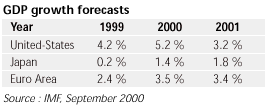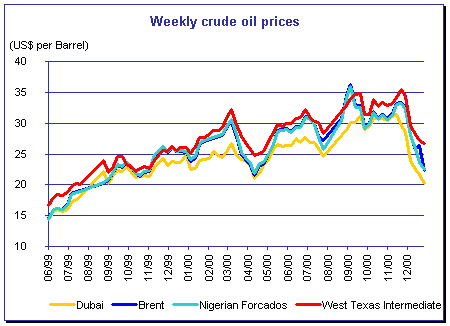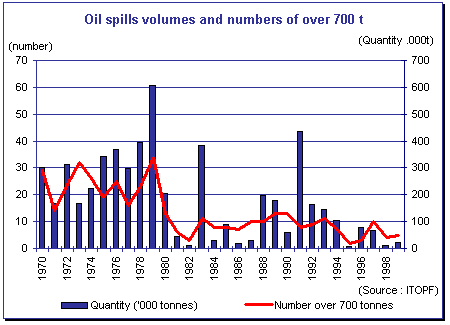
The Tanker market
in 2000
|
|
|
|
|
|
| |
|
|
The evolution in freight rates as compared to 1999
has been a real revolution ! Things have accelerated at a pace that no
expert could have predicted. From a situation of pseudo-crisis, owners
have swung in the space of several months to an unexpected climate of
high profitability. This change is all the more surprising in that it
applies throughout the whole range of the tanker fleet.
Not only is this a situation which has not been seen
since 1973, but above all it seems that it has put paid to the wild
fluctuations in rates which have been so characteristic of previous
years. Everything points to the tanker market world entering in a new
era.
The profound "sea change" which has
occurred is in fact due to a combination of several factors : a
sustained world growth producing a strong demand for crude oil, a rise
in crude prices which has prompted producers to increase their
production, and a much greater extension shown by both owners and
charterers to aspects of security.
Thus after a quick analysis of the various
contribution causes, we shall review the actual effects that have been
produced in the main tanker categories. And finally we will try to give
our explanations as to why we think that today's current climate is
likely to continue over the next few years.
|
| The main reasons for this improvement |

|
|
The
majority of oil importing countries have experienced an extremely strong
economy, with record growth levels

For the majority of countries hit by the Asian
crisis, the recoveries were much quicker than predicted and their energy
requirements grew rapidly. Similarly western countries and in particular
the U.S. maintained their growth and energy high levels of consumption.
Nonetheless it is worth recalling that the forecast is for a reduced
growth in 2001 and that the overall situation in certain countries
(Korea and above all Japan) is far from being remedied.
Whereas in 1999 the rise in crude oil prices was
dictated by political restrictions from producing countries, the
scenario in 2000 was quite different. OPEC has loosened its grip by
increasing its production quotas and the majority of producers are now
at their maximum capacity. Oil prices are subject again to the
traditional laws of supply and demand, whereas to some extend, last year
they were artificially sustained.

|
|
Despite the context of strong demand, global tanker
capacity would have been able to fulfill the needs without precipitating
the substantial upheavals that we have seen in the freight rates.
Despite the considerable achievements made by the
vast majority of oil companies and shipowners over the last 20 years in
maritime safety measures and a proportional drop in oil spill accidents,
a single disaster was enough to set the market ablaze.
The over-reaction of the media which followed the
sinking of the 'Erika' and the extreme commentaries and conclusions
which followed, helped provoke an electric shock amongst the players of
the profession. The recent accident on the Mississippi of the 'Westchester'
will certainly help to consolidate a good number of safety measures
taken and accelerate even faster the disposal of single-hulls.
Whilst some of the decisions adopted by politics and
oil companies could be termed arbitrary, they have resulted overnight in
a totally new and radical approach in determining the choice of tonnage.
Following the U.S. lead, Europe collectively is in
the process of setting up its own code of good conduct, affecting the
different players : classification societies, flags states, port state
controls, and the progressive scrapping of the oldest ships, etc.
In anticipation of these measures, a good number of
oil companies have already set up protective steps when chartering-in
and have reinforced their systems of vetting, giving priority to recent
tonnage (less than 15 years) and applying even stricter criteria for
anything between 15 - 20 years.
Given the inherent over-capacity of the world tanker
fleet, and above all its age structure, it has been enough to create a
drastic reduction in tonnage on offer and to send rates sky-high.
Added to this, has been a strategic consolidation of
shipowners, which had started in 1999 and is being reinforced, one can
appreciate in the context of sustained demand, the new configuration of
the current market.

|
| Impact on freight rates |
|
|
|

|
|
From the slump of last year with average earnings
being less than $20,000 per day, shipowners not only have achieved
acceptable payback levels, but are also ending the year in ecstasy with
in some cases earnings up to $100,000 per day !!
With strong demand and full production in most areas,
only the Middle East Gulf can perform as the swing source of supply,
consequently VLCCs movements have been constantly rising.
In addition one cannot overlook the major role that
the West African market plays today : although VLCC liftings remain
globally constant, we can notice that there has been a virtual tripling
of shipments to the East (Korea and China principally).
This market which was relatively marginal for
shipowners up till now, has been transformed into a real "gold
mine" in recent months. It suffices to compare the rates which were
obtained on the West Africa to US Gulf route in 1999 of about $20,000
per day with the steady increase since the beginning of the year to
levels which are exceeding $85,000 per day at the end of the period.
In conjunction with an enforced emphasis on quality
sought by the main charterers (giving a priority to new-built vessels)
it is equally the changes in vessel supply organisation which has
completely reversed the situation.
At the beginning of the year, the setting up the pool
"Tankers International" (the commercial operator of six major
shipowners) had a profound impact on the market, combining good modern
units (25 % of the VLCC fleet under 10 years-old) under one entity. In
the light of a steady and firm demand, the pool was able to exercise its
strengths straightaway. The economic recovery in Asia and the growing
requirements from China helped push up the already high percentage (
over two thirds) of movements to this area.
The Chinese market is far from reaching its full
potential, but the 1.5 million bbl/day of imports averaged over 2000
already is the double of 1999. Whereas up till now only Japan and Korea
have applied strict selection procedures, it is probable that there will
be a progressive tightening of measures by other countries which will
help ensure sustained rates for the years to come.
Even if the economic growth over the next three, four
or five years does not match the current levels, the role of the Middle
East Gulf will become extremely important and will favour the largest
size of units.
|
|
|

|
|
With the exception of a short and sudden drop in
rates at the end of the summer, levels were likewise steadily upwards
for this segment of the market.
On the traditional route of reference West Africa /
US Gulf, the equivalent time period charters went form $15,000 per day
in 1999 to more than $50,000 per day currently.
The other new and significant phenomenon is that the
time yardstick for this category of vessels is no longer West Africa but
the European zone and in particular the Mediterranean. In addition to
the traditional movements from the Sumed pipeline at Sidi Kerir and the
exports of Russian crude from the Black Sea there is now, thanks to the
progressive freeing-up of Iraqi sales, steady movements out of Ceyhan.
The projected crude oil exports from the Caspian Sea
will help strengthen the importance of this zone in the coming years, as
exemplified by the C.P.C. (Capesize Pipeline Consortium) which is due to
come into operation as from July 2001. Its initial capacity with the
Novorossiysk terminal will be about 28 million tons per year. The
Turkish authorities will certainly insist on modern tonnage for the
passage through the Bosporous.
In line with VLCCs, the age structure of Suezmax
fleet has significantly changed over the last few years and the figures
are today comparable in these two categories namely some 70 % less than
15 years and only 30 % above . As a reminder the ratio, only two years
ago was 51/49 %.
In light of the general trend and the recent change
in mentality in the overall market (valid for the three categories -
VLCC / Suezmax / Aframax), a good number of the older vessels have
repositioned themselves East of Suez where conditions are less strict.
But for how long will their situation last ?
|
|
|

|
|
There again from an average of about $10,000 per day
in 1999, the returns have literally taken off this year. On some routes
in recent months, shipowners were obtaining TCE levels above $50,000 per
day!
Rates rose spectacularly over the last twelve months
in all areas. However, for the reasons already mentioned above, this
phenomenon was slightly less pronounced East of Suez.
In the Mediterranean, levels were around $15/16,000
per day in January, and at $50,000 per day during the fourth quarter. In
the North Sea where TCE rates are less significant, they started at
US$20,000 per day to finish at the end of the year sometimes above
$70,000 per day. As to the Caribbean, where the market remains extremely
volatile, January saw slows of $15,000 per day while December hit highs
of $50,000 per day.
In this segment of the tanker fleet, the age
structure is slightly different from the two preceding categories, with
65 % less than 15 years and 35 % above. Nonetheless, it is important to
realise that 27 % of the current fleet is between 15 - 25 years. This
helps explain some draconian measures already taken by some charterers.
On the other hand, a considerable proportion of
newly-built units are transporting refined products, which naturally
limits even further the choice for the crude oil charterers.
Consequently the main oil companies complying to the
new rules or recommendations in forces are confronted with a scarcity of
supply and now have to adopt strategies which they rarely faced in the
past. To ensure quality tonnage, nowadays, to fix tonnage with an
earlier notice to owners. As the majority of voyages are relatively
short, this means that vessels frequently have to perform two or even
three intermediate voyages, thus putting a considerable risk in case of
delays including bad weather or port congestion. Assuming these risks is
yet another reason to expect the preserve on higher freight rates being
maintained.
|
Shipping and Shipbuilding Markets in 2000
I N D E X
|